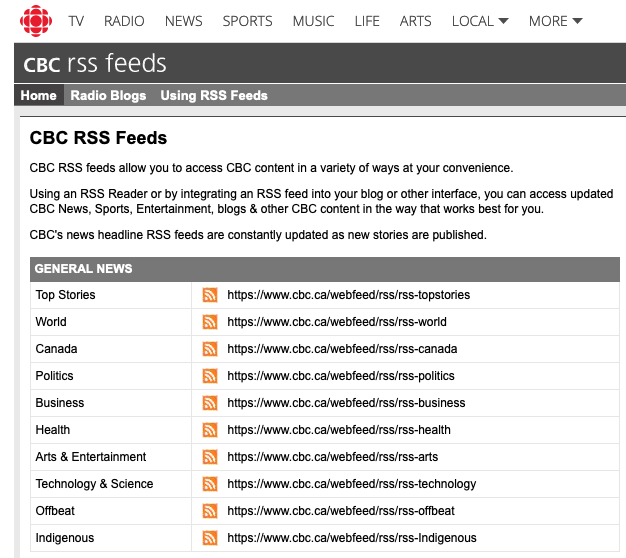In the vast landscape of digital media and information consumption, individuals are often inundated with an overwhelming barrage of content. Within this nuanced environment, Real Simple Syndication (RSS) emerges as a beacon of order, a tool that enables users to curate and filter their informational intake. But what exactly is RSS, and how can it be utilized in a way that resonates with a Christian worldview, fostering spiritual growth amidst the cacophony of today’s digital age? This exploration seeks to answer these questions while also posing a playful challenge to harnessing this technology effectively.
RSS is a web feed format that allows users to access updates to online content in a streamlined manner. By subscribing to RSS feeds, individuals receive the latest posts, articles, or updates from their preferred sources directly in a singular feed reader, eliminating the need to constantly visit multiple websites. This mechanism of aggregation can be likened to gathering manna in the digital wilderness—a way to sustain one’s intellectual and spiritual appetite without being distracted by the excesses that often accompany modern media consumption.
Consider for a moment the scenario: how often do we find ourselves scrolling through social media feeds, drawn into an endless rabbit hole of clickbait, ads, and sensationalism? While the internet is replete with engaging content, the challenge lies in discerning what is truly edifying. As Christians, the pursuit of knowledge and truth must be intentional. Herein lies the power of RSS—by curating an assortment of feeds that align with Christian values, believers can effortlessly remain informed about doctrinal teachings, church news, and theological discussions that contribute positively to their faith journey.
However, the very nature of RSS poses a playful question: Are we prepared to sift through the digital noise and choose sources that bolster our spiritual lives? Or will we allow ourselves to be swept away by the triviality of sensational headlines, becoming spiritual connoisseurs of mere entertainment rather than profound truth?
To utilize RSS effectively, one must first recognize the importance of intentionality regarding content selection. As believers, establishing a foundation of trustworthy and biblically sound sources is paramount. These might include church websites, theological journals, and devotional blogs that provide insights into scripture, contemporary Christian challenges, and spiritual growth. It is beneficial to compile a list of RSS feeds that resonate with your beliefs, ensuring that they align with the teachings found in the Bible. This personalized information network can serve as a digital disciple, guiding and shaping one’s understanding of faith and life in a complex world.
Once a reputable selection of feeds is established, the next step involves choosing a suitable feed reader. There are numerous options available, ranging from simple, user-friendly interfaces to more complex aggregators that facilitate efficient management of multiple feeds. Exploring popular choices such as Feedly, Inoreader, or The Old Reader can prove advantageous. Ultimately, the aim is to cultivate a digital environment that is conducive to growth, rather than distraction.
As you embrace this new way of consuming information, it becomes vital to carve out dedicated time for reflection. RSS is not merely a tool for consumption; it serves as an invitation for meditation and contemplation. By immersing ourselves in the latest articles, blog posts, or podcasts that inspire our faith, we must also strive to engage with this material thoughtfully. Take a moment to reflect on how the content resonates with scripture. Ask questions such as: How does this align with my understanding of God? Does this encourage me to love and serve others more effectively? In what ways can I apply these lessons in my daily life?
Moreover, as you partake in this digital feast of information, it is essential to maintain balance and perspective. The sanctity of silence and solitude remains a critical aspect of spiritual formation. While RSS can help you stay updated, it should complement your spiritual disciplines rather than supplant them. Engaging in prayer, study, and worship should continue to take precedence, fostering a rich communion with God that digital media cannot replace.
In our technologically advanced society, remaining connected with fellow believers and engaging with cutting-edge theological discourse is imperative. However, with the rapid pace of information flow, it is easy to become overwhelmed. By utilizing RSS judiciously, believers can enjoy the benefits of instant updates while cultivating discernment and wisdom in their search for truth.
To encapsulate the essence of RSS in a Christian context is to perceive it as a valuable tool for growth and learning. This digital conduit effectively dispenses spiritual nourishment amid the chaotic influx of information. However, it beckons a crucial challenge—our ability to discern, filter, and engage with the content meaningfully. As the digital landscape continues evolving, may we embrace these technological advancements responsibly and faithfully, continually seeking to glorify God through our interactions with the world. In this pursuit, RSS serves not only as a practical means of staying updated but as an avenue by which the faithful can deepen their relationship with Christ and the world around them.



